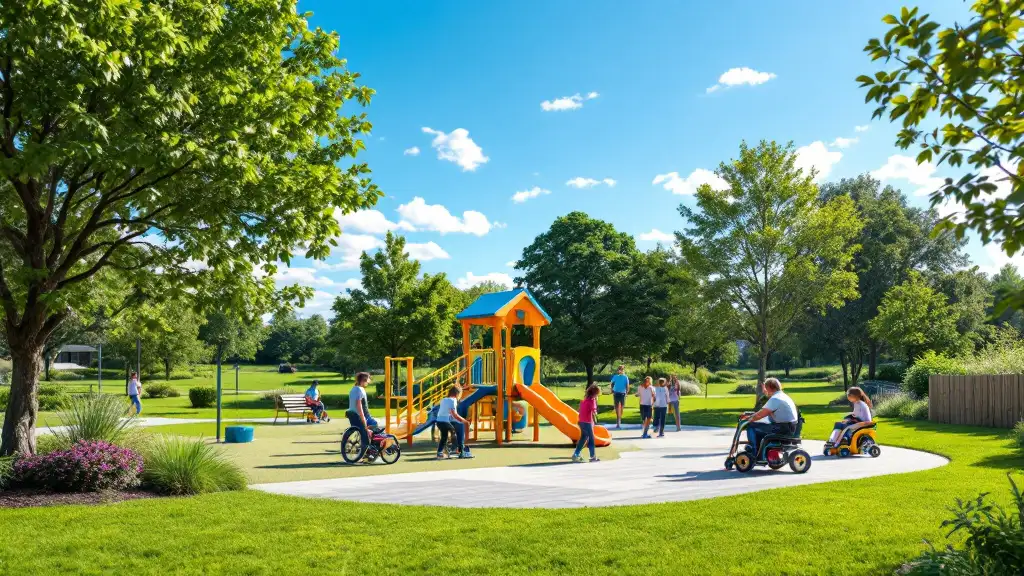
Enhancing Access and Inclusion in Community Activities
The Division of Developmental Disabilities (DDD) has introduced new policies and programs aimed at increasing accessibility and participation for individuals with disabilities in camps, special events, and community-based recreational activities. With recent legal changes and expanded funding options, families and organizations now have more opportunities to engage individuals in enriching experiences that foster independence, social skills, and community integration.
Understanding How DDD Funding Supports Camps and Events

How does DDD funding work in conjunction with Medicaid HCBS waivers for camps and events?
The Division of Developmental Disabilities (DDD) in New Jersey collaborates with Medicaid Home and Community-Based Services (HCBS) waivers to create a flexible funding framework for individuals with developmental disabilities. While Medicaid HCBS waivers primarily cover broad services like therapies, habilitation, and environmental modifications, DDD funding specifically supplements these with targeted support for recreational activities, camps, and social events.
Both funding sources are integrated into the individual's personalized Plan of Care, enabling tailored community participation options. They help fill gaps not fully covered by Medicaid, such as camp tuition, transportation, or specialized recreational programs. This synergy promotes inclusion by providing diverse opportunities for socialization and skill development, making community-based recreational activities more accessible and manageable.
How can organizations and participants access DDD funding for camps and activities?
Organizations and eligible individuals can access DDD supports by following specific application procedures. For children under 21, parents or guardians typically apply through the Children’s System of Care (CSOC) Summer Camp Service program via the PerformCare Family Portal. Required documentation includes proof of Medicaid eligibility, residency, and a formal diagnosis of a developmental disability from before age 22.
For adults over 21, support coordinators help incorporate these activities into the Individual Program Plan (IPP). The process often involves completing assessments like the New Jersey Community Assessment Tool (NJCAT), submission of supporting paperwork, and ensuring the activity aligns with approved service goals. Early preparation is advised due to varying approval timelines.
What are the available funding options and programs through DDD for camps and special events?
The DDD offers multiple funding options suited to different age groups and needs. For youth, the Children’s System of Care (CSOC) provides financial assistance covering significant portions of summer camp costs. For adults, funding may come from fee-for-service programs, self-directed budgets, or individual supports, assessed on a case-by-case basis.
These resources aim to promote active community engagement and independence. Some funding is limited, and eligibility depends on meeting criteria such as diagnosis, residency, and service plan approval. Grants, subsidies, and fee-for-service arrangements help make camps, social outings, and recreational activities financially feasible.
What are the eligibility criteria and requirements for utilizing DDD funding for camps and events?
Eligibility to access DDD funding hinges on a confirmed diagnosis of a developmental disability diagnosed before age 22. Common conditions include autism spectrum disorder, cerebral palsy, and Down syndrome. Applicants must be residents of New Jersey, verified through official documentation.
Furthermore, activities must be included in the individual’s support plan or IPP, demonstrating alignment with the person’s developmental needs. The individual typically needs to be under age 21 for summer camp programs, with certain services extending into adulthood based on the support plan and available funding.
Additional requirements may include participation in NJCAT assessments to determine funding tier levels, involvement of a qualified support coordinator, and verifying that the program meets accessibility and safety standards. These measures ensure that funds are allocated appropriately and serve the intended purposes.
What is the process for applying for DDD funding to support camps and special events?
The application process begins with verifying eligibility through Medicaid and confirming the presence of a qualifying developmental disability. Applicants or guardians must submit forms via online portals like PerformCare, attaching necessary documents such as medical records, proof of residence, and diagnostic reports.
For children’s programs, applications are processed through the Children’s System of Care, with deadlines typically around early summer. An NJCAT assessment is necessary to establish the funding Tier, guiding support levels. Support coordinators assist in developing the individualized plan, requesting funding, and ensuring all documentation, including approvals, is completed timely.
The process involves coordination between applicants, healthcare providers, and support staff to secure funding before camp or event start dates.
What policies and regulations govern the use of DDD funding for camps and special events?
Funding use is strictly regulated by DDD operational policies and federal laws such as the Americans with Disabilities Act (ADA) and Title VI. These regulations ensure accessibility, prevent discrimination, and uphold quality standards.
Funding policies specify eligible expenses—such as tuition, transportation, and supportive services—and outline provider standards, safety requirements, and oversight mechanisms. Camps and events must adhere to local building codes and safety regulations.
Legal protections include penalties for misuse of funds, ensuring compliance with standards that promote accessible, inclusive, and safe recreational opportunities for individuals with disabilities.
How can DDD funding support camps and special events for individuals with disabilities?
DDD funding significantly reduces financial barriers, enabling participation in camps and community events that foster social skills, independence, and community integration. For children and youth under 21, programs like CSOC summer camps provide subsidies that cover a substantial portion of tuition, transportation, and related costs.
For adults, funding can be accessed through support programs like self-directed budgets or waiver supports, which allow individuals to choose and customize recreational activities fitting their preferences. In addition, resources from special needs trusts, waivers, and other programs can complement DDD funding, creating a broader support network.
Overall, these funding avenues help ensure that people with disabilities can access enriching camp experiences, tailored to their needs and interests, while alleviating financial stress on families.
Legal and Policy Framework Ensuring Compliance and Accessibility

What policies and regulations govern the use of DDD funding for camps and special events?
Policies and regulations guiding the use of Department of Developmental Disabilities (DDD) funding are detailed in a variety of legal frameworks and operational manuals. These policies are designed to ensure that funds are used responsibly, ethically, and in compliance with federal laws such as the Americans with Disabilities Act (ADA) and Title VI of the Civil Rights Act. These laws mandate that all services, including camps and special events, are accessible, nondiscriminatory, and meet specific safety and accessibility standards. State-level policies further specify eligibility criteria for services, qualifications for providers, and fiscal accountability measures. These are often enforced through regular audits, monitoring, and reporting requirements. Ensuring adherence to these policies helps uphold the rights of individuals with disabilities, creating inclusive environments that support participation in community activities while maintaining legal compliance.
What recent legal changes in California impact support for social recreation activities?
Effective July 1, 2023, California implemented significant legislative changes aimed at increasing access to social recreation, camping, and non-medical therapies funded by regional centers. These updates prohibit regional centers from requiring the use of in-home supportive services (IHSS) before authorizing social recreation activities. They also prevent families from having to exchange or relinquish other services to access recreational programs. Importantly, the law mandates that regional centers fund social recreation directly, expanding provider options and simplifying approval processes. This streamlining makes it easier for children and adults, especially those from underserved communities and low-income backgrounds, to participate in community-based recreational activities. The law's focus is on expanding funding sources, increasing provider diversity, and removing administrative barriers to foster more inclusive participation.
How does the policy ensure equitable access and prevent discrimination?
Federal laws like the ADA and state statutes play a crucial role in promoting equitable access to community activities funded through DDD. These policies require service providers to meet accessibility standards, including physical access, auxiliary aids, and communication supports. They also prohibit discriminatory practices based on race, income, ethnicity, or disability. Oversight mechanisms such as audits, compliance reviews, and ongoing monitoring ensure that providers follow these standards diligently. By enforcing these policies, the system promotes an inclusive environment where all individuals, regardless of background or ability, can participate safely and with dignity. Such measures help prevent discrimination and ensure that opportunities for social recreation are genuinely accessible to everyone.
What are the requirements for providers to be eligible to accept DDD funding for camps and events?
Providers seeking to accept DDD funding must meet strict qualification standards. These include registering and obtaining necessary certifications under state regulations, as well as adhering to federal standards like those set by the ADA. Providers are required to demonstrate their capacity to deliver accessible, safe, and high-quality services, which involves maintaining trained staff, appropriate facilities, and emergency protocols. Background checks and ongoing compliance monitoring are mandatory to ensure providers operate responsibly. Licensing and operational standards further ensure that services are delivered in environments that prioritize safety, respect, and dignity for participants. These criteria help maintain high standards across funded programs, safeguarding the well-being of individuals with disabilities and ensuring responsible use of public funds.
| Aspect | Requirements | Details |
|---|---|---|
| Legal Frameworks | ADA, Title VI, State Regulations | Mandate accessibility, nondiscrimination, and safety standards |
| Provider Qualifications | Registration, Certification, Quality Standards | Must show capacity for accessible, high-quality services and staff training |
| Funding Use Policies | Purpose and Eligibility Policies | Funds must align with service goals, individual needs, and policy compliance |
| Oversight and Compliance | Audits, Monitoring, Reports | Regular checks ensure adherence to policies and standards |
| Participant Safety and Dignity | Environment Standards, Staff Training, Accessibility Requirements | Ensuring safe, respectful, and accessible service environments |
This complex framework of policies and regulations serves as a foundation that supports the responsible, inclusive, and compliant use of DDD funds to enhance social participation for individuals with developmental disabilities in California.
Fostering Inclusive Community Engagement
Advances in policy and increased funding opportunities through the DDD are transforming the landscape of recreational and camp services for individuals with disabilities. These initiatives promote not only participation but also independence, social integration, and community belonging. As California continues to refine its legal and operational support, families and organizations can look forward to more seamless, accessible, and enriching experiences for everyone. The ongoing commitment to inclusivity underscores the importance of collaboration among legislatures, service providers, and families to create truly welcoming community environments where everyone can thrive.
References
- Changes to Social Recreation and Camping: FAQ
- Get extra Regional Center support this summer
- California Funding Options for Children with Disabilities
- Community Facilities Direct Loan & Grant Program
- Funding & Payment Options for Special Needs Camps
- The Dominick Della Rocca Summer Camp Scholarship Fund
- DDD Programs
- Accessing Services from the Division of Developmental ...
- Division of Developmental Disabilities












